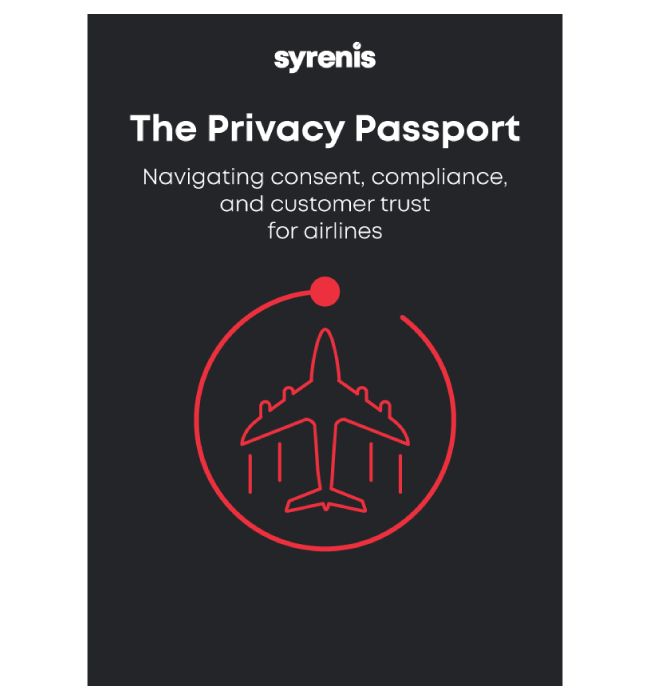Understanding and acting on passenger preferences is a necessity in the airline industry. From how travelers book their flights to how they want to be communicated with, preferences shape every stage of the customer journey. Airlines that can capture, manage, and respect these preferences not only meet rising expectations for personalization but also build trust, ensure regulatory compliance, and unlock operational efficiency.
Preference management is now a strategic imperative for airlines. So why should compliance, marketing, and IT teams work together to deliver experiences that are both personalized and privacy-conscious?
Key takeaways
- Passenger preferences are central to airline success: influencing everything from booking behavior to communication channels and loyalty engagement.
- Personalization must be balanced with privacy: passengers expect tailored experiences but demand transparency and control over how their data is used.
- Over 50% of travelers use mobile and contactless tools, and a majority prefer digital-first, preference-aware interactions — making real-time preference management essential.
- Compliance, Marketing, and IT teams must collaborate to ensure consent and preference data is captured, stored, and applied consistently across systems and jurisdictions.
- Consent and Preference Management platforms provide the infrastructure airlines need to build trust, meet regulatory requirements, and deliver competitive, customer-centric experiences.
Jump to:
- The privacy landscape in aviation
- Personalization vs. privacy: A marketing balancing act
- Why consent and preference management is essential for airlines
- From obligation to opportunity: Rethinking Privacy in Aviation
The privacy landscape in aviation
The aviation industry operates across borders, making it uniquely exposed to a complex web of privacy regulations. From the California Consumer Privacy Act (CCPA) and Colorado Privacy Act (CPA) in the U.S., to the General Data Protection Regulation (GDPR) in Europe and PIPEDA in Canada, airlines must navigate a patchwork of laws that govern how personal data is collected, stored, and used.
In the U.S., the Department of Transportation (DOT) plays a central role in enforcing privacy protections for airline passengers. Airlines and ticket agents are prohibited from engaging in unfair or deceptive practices, including violations of their own privacy policies or federal rules such as the Children’s Online Privacy Protection Act (COPPA). The DOT has the authority to investigate complaints and impose civil penalties for violations, reinforcing the need for transparent and responsible data practices (DOT Aviation Privacy).
Personalization vs. privacy: A marketing balancing act
Airlines are under increasing pressure to deliver hyper-personalized experiences that anticipate passenger needs, enhance loyalty, and drive revenue. From tailored offers and dynamic pricing to individualized in-flight entertainment and real-time travel updates, personalization has become a powerful differentiator in a highly competitive industry.
But with great personalization comes great responsibility.
As passengers grow more aware of how their data is collected and used, the demand for transparency, control, and ethical data practices is rising. Airlines now face a critical balancing act: how to harness the power of personalization without crossing the line into intrusion. The challenge isn’t just technical, it’s about aligning marketing innovation with evolving expectations around privacy, consent, personal preferences and trust.
Why personalization matters
Passengers increasingly expect airlines to know their preferences – from seat selection and meal choices to communication channels and loyalty rewards. According to the IATA Global Passenger Survey 2024:
- 71% prefer online or app-based booking, and 53% prefer using the airline’s own digital platforms.
- Over 50% of passengers now use mobile devices and contactless payments for travel-related interactions.
- 89% are interested in trusted traveler programs, and 85% are willing to share immigration data in advance if it improves the experience.
These figures show that passengers are now expecting personalization. They want relevant offers, timely updates, and seamless service across every touchpoint.
Why privacy cannot be compromised
At the same time, passengers are becoming more aware of how their data is used. While 75% prefer biometric ID over traditional methods, 50% still express concerns about data protection. This highlights a critical truth: trust is the currency of personalization.
For marketing teams, this means personalization must be built on a foundation of explicit consent and transparent data practices. For compliance professionals, it means ensuring that every data-driven interaction aligns with global and domestic privacy laws. And for IT leaders, it means building systems that can capture, store, and honor preferences in real-time across every channel and device.
The strategic advantage of preference management
When done right, preference management becomes a strategic enabler:
- It empowers passengers to define how they want to be engaged.
- It reduces opt-outs and increases engagement by aligning with user expectations.
- It builds long-term loyalty by demonstrating respect for individual privacy.
Airlines that embrace this model are not only more compliant — they’re more competitive.
IT’s role in operationalizing consent
Behind every seamless passenger experience is a complex IT infrastructure that must integrate consent and preference signals across multiple systems: booking engines, mobile apps, CRM platforms, and third-party vendors. For IT leaders, the challenge lies in ensuring that these signals are:
- Captured accurately at every digital touchpoint.
- Stored securely and in compliance with data retention policies.
- Propagated in real-time across the organization’s ecosystem.
This requires scalable, interoperable solutions that can adapt to evolving regulatory requirements and support enterprise-wide data governance.
Why consent and preference management is essential for airlines
Effective Consent and Preference Management (CPM) platforms are the cornerstone of a privacy-first strategy – it is key for:
- Centralized control: A single source of truth for all consent and preference data.
- Granular consent: Allowing passengers to choose how, when, and why their data is used.
- Auditability: Full traceability to demonstrate compliance during audits or investigations.
- User empowerment: Enabling passengers to update their preferences at any time, across any channel.
By implementing a CPM solution like Cassie, airlines can meet regulatory obligations and unlock new opportunities for customer engagement and loyalty.
From obligation to opportunity: Rethinking Privacy in Aviation
In an industry where customer experience is a key differentiator, managing passenger preferences is a competitive advantage. Airlines that invest in enterprise-grade Consent and Preference Management will be better equipped to:
- Navigate global and U.S. privacy regulations with confidence.
- Build lasting trust with passengers.
- Deliver personalized experiences that respect individual privacy.
As privacy expectations rise and regulatory scrutiny sharpens, the ability to manage consent and preferences at scale is emerging as a core innovation capability for modern airlines. Those that invest in intelligent, privacy-first infrastructure won’t just stay compliant, they’ll unlock new opportunities to build trust, deepen loyalty, and drive sustainable growth.

Unlock The Privacy Passport
The Privacy Passport is a strategic guide designed for airline leaders to embed privacy, consent, and trust into every layer of their operations- turning compliance into a competitive advantage.
- Unpacks global privacy regulations and aviation-specific risks
- Shows how consent and preference management fuel trust and personalization
- Offers C-suite insights and a practical checklist for privacy and AI readiness

